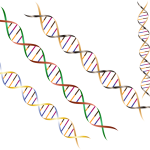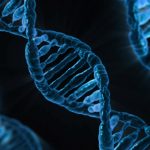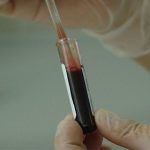The National DNA Database Is Watching You

Back in 2012, then NSW police minister Michael Gallacher proposed the establishment of a national DNA database, suggesting that genetic samples be taken from all newborns. The stored information could then be accessed under a Supreme Court warrant, and compared with crime scene DNA.
Not surprisingly, this Orwellian idea came under the scrutiny of civil liberty organisations who expressed concerns the material would be accessed for extraneous reasons.
However, a national DNA database does exist. In fact, three do. The Australian Federal Police operate a DNA database for law enforcement purposes.
There’s the Disaster Victim Identification database to help identify the casualties of overseas incidents, and there’s the National Criminal Investigation DNA database (NCIDD), which was established back in 2001.
Australia-wide database
The NCIDD provides police and forensic scientists with access to DNA profiles of convicted criminals, which they can then match with samples taken from crime scenes and individuals. The database is intra-jurisdictional, meaning all Australian state and territory databases are connected and DNA profiles can be shared.
The Australian Criminal Intelligence Commission (ACIC) now operates this database, following the merger of the CrimTrac agency and Australian Crime Commission in 2016. The ACIC is a national law enforcement agency responsible for the sharing of criminal intelligence information.
As of 2014, the NCIDD held 830,000 DNA profiles, and it is constantly growing. Each year, the NCIDD conducts 68,000 attempts to match profiles on the database with crime scene DNA, and more than 72,000 comparisons from crime scene to crime scene.
This information can travel further than just interstate. In November 2014, Australian justice minister Michael Keenan announced the nation was entering into a pilot program with the UK, the US and Canada, enabling the international exchange of DNA information.
DNA profiling in NSW
Every person’s DNA is unique, except identical siblings. Sections of an individual’s DNA, called short tandem repeats, are used to create a DNA profile. These DNA sections are non-coding, and therefore don’t provide information about an individual, beyond identifying them.
In NSW, obtaining DNA samples is primarily governed by the Crimes (Forensic Procedures) Act 2000, which allows for samples to be taken from a suspect with their informed consent or, in the case of a suspect refusing to provide a sample, police applying for a court order.
If a person is convicted of a crime, their DNA can be stored on the database indefinitely. However, if a suspect has had their conviction quashed, their profile is meant to be destroyed.
Not infallible
While DNA matching is more reliable than many other forensic techniques, it is certainly not foolproof. DNA profiles have been incorrectly matched in several cases in the past. Samples have also been contaminated in the laboratory, and there have been cases where they’ve been wrongly labelled.
Dr Marcus Smith is Adjunct Professor of Law at the University of Canberra, and the author of DNA Evidence in the Australian Legal System, published by Lexis Nexis in 2015. He pointed to the case of R v Jama which went before the Victorian Court of Appeal in 2009, as an example of how things can go terribly wrong.
Farah Jama was convicted in 2008 of sexually assaulting an unconscious 48-year-old woman in a Doncaster nightclub. Samples taken from the woman’s body were found to match Mr Jama’s DNA, after police conducted a routine check of the police database.
There was no evidence placing Jama at the club on the night of the incident. “The only evidence that the prosecution had against him was the DNA evidence,” Dr Smith told Sydney Criminal Lawyers. “But in spite of this, he was still convicted.”
Mr Jama “went to gaol for 18 months before it was discovered that contamination occurred when forensic samples were taken from the victim,” Dr Smith added.
The Appeal court found that the officer who examined the woman had earlier taken samples from another woman in the same room, a person who had engaged in consensual sexual intercourse with Mr Jama.
NSW police backtracking samples
In a move that ruffled many a civil libertarian’s feathers, the NSW police started carrying out their DNA Back-capture program a few years back. The program involves officers turning up on the doorstep of people who’ve been convicted of a serious crime in the past and requesting a DNA sample.
Under section 75A of the Crimes (Forensic Procedures) Act, police are empowered to collect samples from an “untested former offender.” The legislation provides that this is either someone who has been imprisoned for a serious indictable offence, or has been served with a court attendance notice connected with an indictable offence.
A serious indictable offence is one that comes with a maximum penalty of at least 5 years imprisonment. However, a person can be tested, regardless of how much prison time they served. And most offences contained with the Crimes Act are ‘indictable’, which means they are capable of being referred on their own to a higher court such as the District Court, rather having to remain in the Local Court.
This allows police to cast an extremely wide net when gathering profiles to enter into the database. Indeed, although the program was premised on targeting reoffenders, those who have merely been served with a court attendance notice for an indictable charge can find themselves on the database, in the absence of any conviction.
If a person refuses to provide a sample, police can apply for a court order. If this is granted and a person continues to refuse, they can be fined $5,500 and/or imprisoned for up to a year.
In Dr Smith’s opinion, if a person has been “convicted of crime that was punishable by a sentence of five years,” then “it’s appropriate for their DNA to be included on a database.” But he added that “if somebody is only suspected of a crime” or found innocent, then their profiles should be removed.
South Australia
However in South Australia, authorities take DNA profiling a step further. SA police can take samples from people they merely suspect of having committed a crime that is punishable by any length of time of in prison, however trivial.
And once these DNA samples are taken, they remain on the database forever, regardless of whether the person is cleared of the crime.
This approach has been criticised for giving SA police a backdoor way of extracting evidence, as they can charge someone with a trivial offence with a view to obtaining their DNA sample.
Police can then try to match this sample to one obtained at a serious crime scene, without having any firm evidence to actually undertake this measure.
Many believe this type of conduct amounts to an abuse of process.
DNA developments are broadening the reach
As Dr Smith points out, authorities are currently “expanding the scope of the national database, without actually expanding the number of people on it,” with the introduction of familial searching.
In a scenario where a DNA sample has been found at the scene of a crime, which does not match a sample on the database, police can now utilise familial searching, which can identify if they have any relatives on the system, and then identify the suspect through traditional police investigation.
In this and other ways, technological advancements are allowing police to search for a suspect’s DNA, even if they don’t have their profile in the DNA database.
Receive all of our articles weekly
Authors

Paul Gregoire







